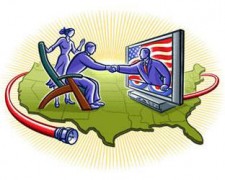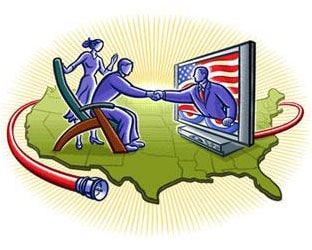 Pro-life candidate Randall Terry is on the ballot for president in the state of West Virginia, and wants to air advertising on Gannett’s CBS WUSA in Washington DC. Gannett said the station doesn’t serve West Virginia, but Terry has pressed his case and won the dispute.
Pro-life candidate Randall Terry is on the ballot for president in the state of West Virginia, and wants to air advertising on Gannett’s CBS WUSA in Washington DC. Gannett said the station doesn’t serve West Virginia, but Terry has pressed his case and won the dispute.
The dispute boiled down whether any parts of West Virginia are included in the stations noise limited service contour (NLCS), or whether Gannett could use the Longley-Rice contour prediction method, which takes terrain into account.
Under NLCS, the station reaches Jefferson County, home of 54K citizens of the 1.855M citizen state.
WUSA argued that even if NLCS is used, the fact remains that it serves Washington DC, not West Virginia, and should not be forced to run Terry’s advertising.
Taking Longley-Rice into account, which would bring the Appalachian Mountains into the equation, Gannett argued that very few West Virginians could pick up the station at all, and if any did it would be a de minimis amount.
The FCC said it had to act quickly with the election clock running down. It therefore elected to ignore Longley-Rice, accepted the NLCS contour definition, and ordered Gannett and WUSA to afford reasonable access to Terry for advertising time.
RBR-TVBR observation: This case illustrates the near-impossibility of crafting a regulation that can accommodate all situations that might arise. As a former resident of the Washington DC area and viewer of WUSA, I can say from personal experience that the last thing my family needed was more political advertising, particularly aimed at places like West Virginia which is not a part of the broad local Washington community.
West Virginia has its own television stations, and since they are in vastly smaller markets than Washington DC, we imagine it is a lot less expensive to advertise on them than it would be on a network affiliate in Washington.
We therefore find it hard to believe that Terry’s ultimate goal here is to reach a tiny sliver of West Virginians with a signal that may or may not even get to them.
Terry has advertising content that WUSA does not want to run, but by exploiting a technicality, he will be able to air it for the benefit of a potentially hundreds of thousands of people who do not vote in the state of West Virginia on the stated intention of possibly reaching a small portion of the population of that state.
The fact that Terry’s prospects of election are negligible, based on any metric one cares to consider, should alone be enough to allow a station to turn down his advertising in the general election.
This is one area of law and regulation that needs an overhaul.
Or maybe the CEO of some tobacco company will run for president so we can then enjoy the rebirth of TV ads for cigarettes.






I suspect the ultimate goal of Terry’s challenge is to receive free news coverage of his champaign by painting WUSA as the liberal media that refuses his money on a technicality. Look. He got national coverage from you!
Comments are closed.